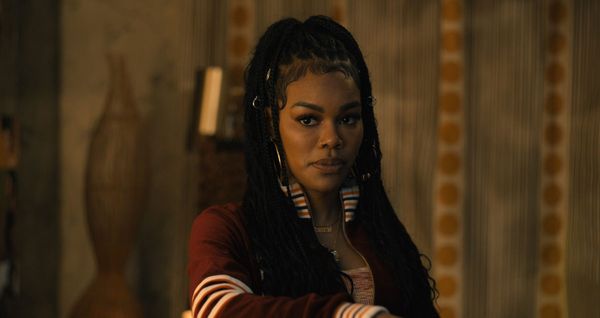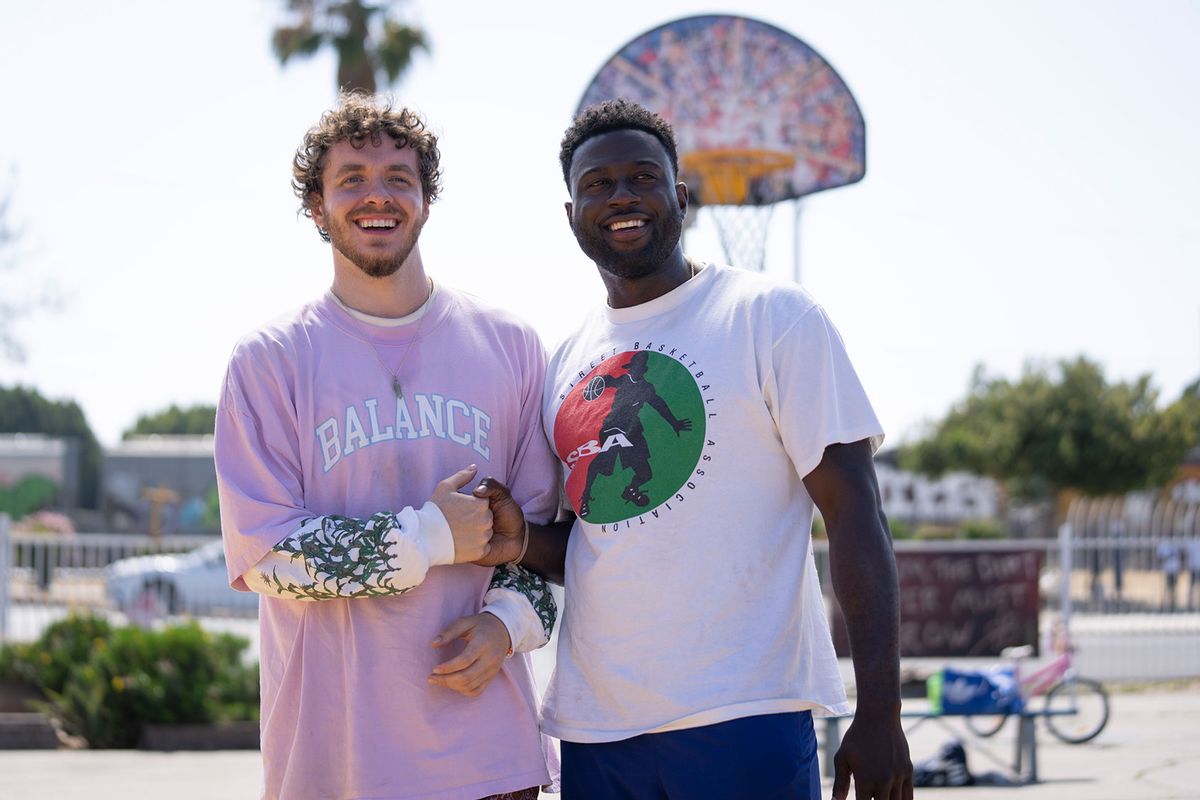Director Calmatic's low-intensity remake of Ron Shelton's 1992 raucous sports comedy, "White Men Can't Jump," is a leaner but imperfect version of this story about two basketball hustlers, one Black, one white. Shrewdly, this new version, written by Kenya Barris and Doug Hall, excises the "Jeopardy!" subplot from the original — perhaps because no one could ever top Rosie Perez's singular performance.
Another upgrade is that this remake focuses on Kamal (Sinqua Walls), a failed player who may be looking for a second chance. Ten years ago, he was a high school legend who was destined for greatness, but his anger issues, among other things, got him into trouble. Now he is working as a delivery man and playing pickup games. He resists his friends Speedy (Vince Staples) and Renzo's (Myles Bullock) suggestion that he compete in 2-on-2 tournaments until a funny-dressing, detox-drinking white boy named Jeremy (Jack Harlow) comes into his house and beats him in a shootout.
As Jeremy, the white guy assumed to be terrible at hoops, Jack Harlow, in his film debut, lacks the sly goofball verve that Woody Harrelson exhibited in the original. The main reasons this update throws a brick is because the miscast Harlow is hardly the charming rascal that Harrelson's character, Billy Hoyle, was. Moreover, as the focus of the film's B-story, Harlow is lazy on D. He should be ingratiating as a guy who needs fast money, suffers from knee issues and has problems with his girlfriend, Tatiana (Laura Harrier), a dancer. (He lies to her about the pain pills he is taking and his gambling.) These storylines should make viewers care about Jeremy, but they deflate the film because Harlow has zero charisma. He also fouls trying to sell his lines whether he is being sincere or dryly funny. The film is best when Jeremy is benched.
In contrast, Walls' Kamal is the film's point guard, carrying the film with his dexterity as well as his deadpan and hangdog expressions. Kamal's character is different from Wesley Snipes' showboating Sidney Deane, which is a marked improvement. Kamal is grappling not just with his career disappointment but also with a dying father (the late Lance Reddick), who was his strongest advocate. Repeated flashbacks to his younger days illustrating his emotional pain and regrets feel unnecessary. Adding to his troubles, Kamal's wife, Imani (Teyana Taylor), wants to open a hair salon, and needs money to achieve her dream. But when Kamal refuses to take a selfie for a customer on his route, he loses his s**t and then loses his shifts. He then decides to team up with Jeremy to win $25,000 in a tournament.
"White Men Can't Jump" does get some mileage out of the racial friction between Jeremy and Kamal, but some of their conversations, such as where Jeremy says inappropriate things about how well-spoken Kamal is, and how Kamal, "Doesn't scream thuggish even though [he is] chocolate-chocolate" are more cringy than funny. Even when Jamal reluctantly admits to liking Ed Sheeran, and Jeremy responds, "I like the shape of you," it flops.
 Teyana Taylor in "White Men Can't Jump" (20th Century Studios)
Teyana Taylor in "White Men Can't Jump" (20th Century Studios)
The film tries too hard to mine humor from pop culture references. At one point, Jeremy is warned that if he takes too many pills, he will be "on Hollywood Boulevard doing TikTok dances without a cell phone." There are at least two OnlyFans references, neither of which is funny, plus a dumb running joke about edibles in cupcakes that might have been amusing 30 years ago, but is tired now. At least Vince Staples and Myles Bullock provide some chuckles with their trash-talking. (And this version pays homage to the original by including a line about going to Sizzler.)
Another problem is that Calmatic does not inject enough energy into his film. The basketball hustling scenes, set to old-school needle drops including the O'Jays' "For the Love of Money," and War's "Why Can't We Be Friends," lack excitement. The film does not quite share the love of the game its characters have. The first tournament in Venice, which goes poorly, doesn't exploit the rivalry Kamal and Jeremy have against known opponents, whereas the big $500,000 Village Classic in the film's end does not have enough rivalry to motivate Jamal and Jeremy to succeed.
Want a daily wrap-up of all the news and commentary Salon has to offer? Subscribe to our morning newsletter, Crash Course.
There are, however, some inspiring off the court scenes. One speech Imani gives to encourage Kamal is terrific, and Teyana Taylor, fresh off her star-making and award-worthy performance in "A Thousand and One," delivers outstanding support. Likewise, a chat Kamal has with his hospitalized father is quite moving.
Walls' likeable presence is what scores in this version of "White Men Can't Jump" which in basketball slang is an "ankle-breaker" — a particularly effective crossover that causes the defender to slip or fall down. There are just enough decent elements here, including a fun cameo by pro baller Blake Griffin, to justify watching.
"White Men Can't Jump" is streaming on Hulu starting May 19.



Shares